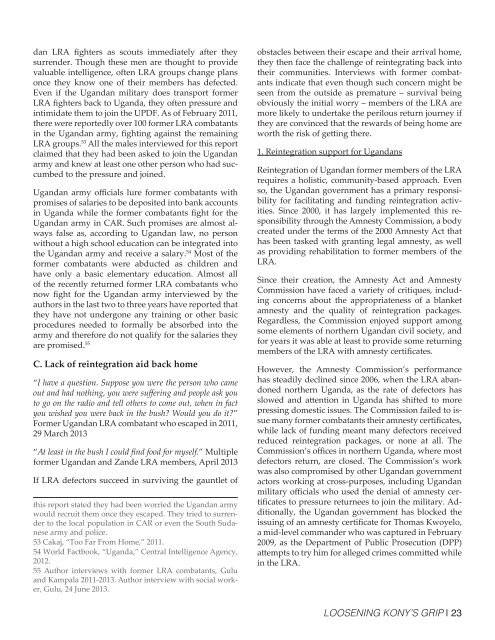Loosening-Konys-Grip-July-2013-FINAL
Loosening-Konys-Grip-July-2013-FINAL
Loosening-Konys-Grip-July-2013-FINAL
Create successful ePaper yourself
Turn your PDF publications into a flip-book with our unique Google optimized e-Paper software.
dan LRA fighters as scouts immediately after theysurrender. Though these men are thought to providevaluable intelligence, often LRA groups change plansonce they know one of their members has defected.Even if the Ugandan military does transport formerLRA fighters back to Uganda, they often pressure andintimidate them to join the UPDF. As of February 2011,there were reportedly over 100 former LRA combatantsin the Ugandan army, fighting against the remainingLRA groups. 53 All the males interviewed for this reportclaimed that they had been asked to join the Ugandanarmy and knew at least one other person who had succumbedto the pressure and joined.Ugandan army officials lure former combatants withpromises of salaries to be deposited into bank accountsin Uganda while the former combatants fight for theUgandan army in CAR. Such promises are almost alwaysfalse as, according to Ugandan law, no personwithout a high school education can be integrated intothe Ugandan army and receive a salary. 54 Most of theformer combatants were abducted as children andhave only a basic elementary education. Almost allof the recently returned former LRA combatants whonow fight for the Ugandan army interviewed by theauthors in the last two to three years have reported thatthey have not undergone any training or other basicprocedures needed to formally be absorbed into thearmy and therefore do not qualify for the salaries theyare promised. 55C. Lack of reintegration aid back home“I have a question. Suppose you were the person who cameout and had nothing, you were suffering and people ask youto go on the radio and tell others to come out, when in factyou wished you were back in the bush? Would you do it?”Former Ugandan LRA combatant who escaped in 2011,29 March <strong>2013</strong>“At least in the bush I could find food for myself.” Multipleformer Ugandan and Zande LRA members, April <strong>2013</strong>If LRA defectors succeed in surviving the gauntlet ofthis report stated they had been worried the Ugandan armywould recruit them once they escaped. They tried to surrenderto the local population in CAR or even the South Sudanesearmy and police.53 Cakaj, “Too Far From Home,” 2011.54 World Factbook, “Uganda,” Central Intelligence Agency,2012.55 Author interviews with former LRA combatants, Guluand Kampala 2011-<strong>2013</strong>. Author interview with social worker,Gulu, 24 June <strong>2013</strong>.obstacles between their escape and their arrival home,they then face the challenge of reintegrating back intotheir communities. Interviews with former combatantsindicate that even though such concern might beseen from the outside as premature – survival beingobviously the initial worry – members of the LRA aremore likely to undertake the perilous return journey ifthey are convinced that the rewards of being home areworth the risk of getting there.1. Reintegration support for UgandansReintegration of Ugandan former members of the LRArequires a holistic, community-based approach. Evenso, the Ugandan government has a primary responsibilityfor facilitating and funding reintegration activities.Since 2000, it has largely implemented this responsibilitythrough the Amnesty Commission, a bodycreated under the terms of the 2000 Amnesty Act thathas been tasked with granting legal amnesty, as wellas providing rehabilitation to former members of theLRA.Since their creation, the Amnesty Act and AmnestyCommission have faced a variety of critiques, includingconcerns about the appropriateness of a blanketamnesty and the quality of reintegration packages.Regardless, the Commission enjoyed support amongsome elements of northern Ugandan civil society, andfor years it was able at least to provide some returningmembers of the LRA with amnesty certificates.However, the Amnesty Commission’s performancehas steadily declined since 2006, when the LRA abandonednorthern Uganda, as the rate of defectors hasslowed and attention in Uganda has shifted to morepressing domestic issues. The Commission failed to issuemany former combatants their amnesty certificates,while lack of funding meant many defectors receivedreduced reintegration packages, or none at all. TheCommission’s offices in northern Uganda, where mostdefectors return, are closed. The Commission’s workwas also compromised by other Ugandan governmentactors working at cross-purposes, including Ugandanmilitary officials who used the denial of amnesty certificatesto pressure returnees to join the military. Additionally,the Ugandan government has blocked theissuing of an amnesty certificate for Thomas Kwoyelo,a mid-level commander who was captured in February2009, as the Department of Public Prosecution (DPP)attempts to try him for alleged crimes committed whilein the LRA.LOOSENING KONY’S GRIP | 23


